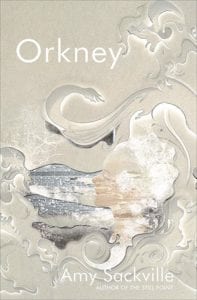
A literature professor honeymoons with his much younger bride on the Orkney Islands in this beautifully rendered tale of love and obsession. If you have yet to read Amy Sackville, prepare to be entranced.
Shelf Unbound: Like your debut novel The Still Point, which was long-listed for the Orange Prize, Orkney is very much a novel of place, with the sea being not just the new young bride’s obsession but also a
character, a metaphor, a part of the novel’s overall dreamscape. How did you decide to place your May-December newlyweds by the sea?
Amy Sackville: The place and the characters arrived at the same time; it was that situation, of a couple in isolation on the island, that I started with. (Two clichés in one—the professor marrying his student, the woman gazing out to sea—but I’m quite interested in clichés. I’m interested in received narratives, I’m interested in resuscitating dead metaphors.) It is undeniably an enduring image, the figure on the shoreline; there’s both yearning and fear in it; standing there you feel yourself somehow dissipate, the borders of the self seem less solid, I think. And that idea, of self and landscape becoming inextricable, is central to the book; it’s one long pathetic fallacy, in a way. The sea conditions the formal framework of the book. There is a repetitive patterning, and a play on presence and absence, text and white space, which plays on the rise and fall of waves, the ebb and flow of tides.
It’s not just any sea, either; the specific place is important. I am interested in Orkney as a place of mutability; one can’t always discern the border between sea, land and sky, and those borders are constantly in flux. I spent a few days on Westray, at the far Northwest of the peninsula, and it is a beautiful and bewildering place; I spent most of my time just watching the weather changing. There is a layering and fluidity of meaning, too; Orcadian archaeology, history, myth, story, are all interwoven. I think that kind of instability, meaning shifting and mutating and slipping out from the grasp, is thrilling and vertiginous and compelling for me as a writer.
Shelf: Dreams and dreamlike language and imagery run throughout Orkney. We, along with the husband, for example, get to know the wife mainly through the intense and fantastical dreams she recounts to him upon waking. What draws you to dreams?
Sackville: I have always been a vivid dreamer, or perhaps I just remember my dreams more clearly than most people. My family typically greets the announcement “I had such a weird dream last night” with a groan. People say there’s nothing more boring than hearing about other people’s dreams, but as with any narrative, it’s the way you tell ‘em… I find the logic of dreams fascinating, the shifts and associations, the disjuncture, the synaesthesia, and most of all the fact that none of these things, in the dream, seem strange. I am interested in the profound dread that can accompany even the most innocuous of dreams, which can haunt you all day, even if you can’t say when you wake what it was that made the dream unsettling.
In Orkney in particular I am interested in the gaps in narrative, and in attempting to tell a dream we must always find a way to accommodate those gaps. We say “and then for some reason…,” “and then I can’t remember a bit but then…,” or just, “and then” (which is the logic of dream narrative—and then, and then). When Richard’s wife tells her dreams, these are some of the most sustained parts of her speech that we hear (the only comparable sections are when she’s telling fairy tales). She exists most vividly in these in-between places; she relates her dreams half-waking, and they reveal the fears and compulsions that she can’t or won’t articulate through rational, waking speech. Like her, I have recurring dreams of floods and of water overwhelming me, and almost all of her dreams are my dreams.
Shelf: Orkney is your second novel. What did you learn or discover in writing The Still Point that informed or influenced Orkney?
Sackville: The practical stuff: how, when, where I like to write; how to balance planning, research and writing, how to balance instinct and craft; how long it takes to rework a first draft and how to go about that. But, saying that, even those processes were quite different, because the book is very different structurally and the way it was composed reflected that. I would like to say I learned, on the one hand, not to procrastinate, and on the other, not to beat myself up about doing so (because sometimes it’s necessary)—but I still haven’t learned not to do either. I think, actually, that it was a line in The Still Point—something about a sketch of the island that the explorer character ends up on becoming “another Orkney”—that put these islands in particular into my head.
